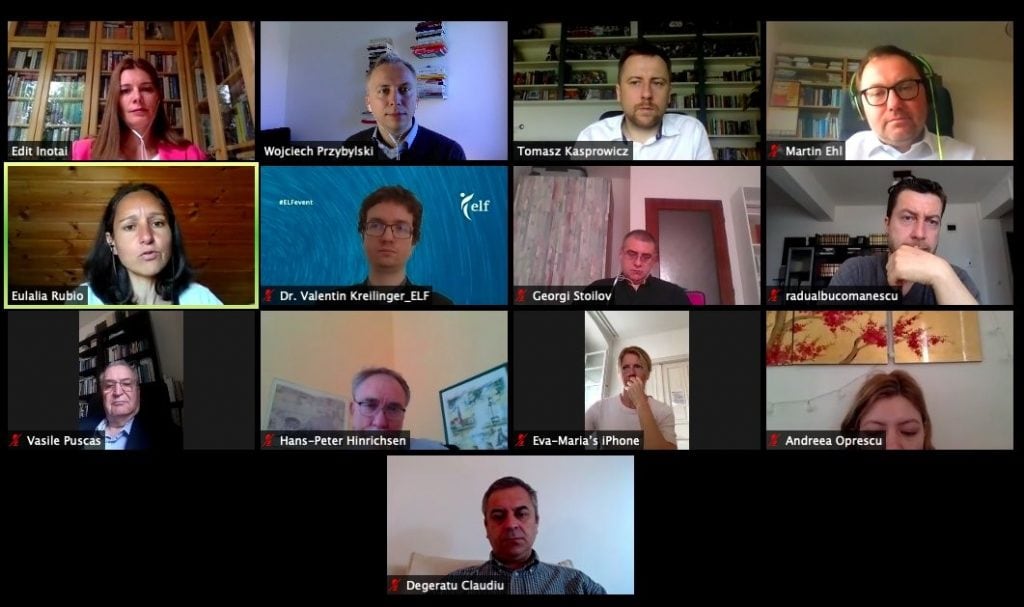How the V4 Has Responded to the Commission’s Proposal
While the recovery fund announced by the European Commission is only the beginning of a lengthy political discussion, it has reinvigorated the budgetary negotiations and encourages a reflection on the long-term future of the EU.
The last couple of weeks have seen a number of new proposals announced in response to the COVID-19 crisis and the sharp economic hit to the economies of the EU27. This comes on top of discussions about the future shape of the long-term EU budget as well as the measures the EU needs to introduce to meet its ambitious climate targets.
The next Multiannual Financial Framework and Central European perspectives to the latest proposals were the subjects of last week’s V/I Breakfast discussion in partnership with the European Liberal Forum. The regular gathering format continues to take place online, which allows for a greater number of participants to discuss ongoing developments in Europe and to make sense of what is happening at times of the pandemic crisis.
Space for compromise
During the online meeting, Senior Research Fellow of Economic and Social Affairs at the Jacques Delors Institute Eulalia Rubio suggests that the proposal that the European Commission put on the table seems reasonable and intelligent, especially from a macroeconomic perspective.
She highlights three main pillars of the proposal: support to member states, support to firms and support to healthcare systems. In addition, there is a logic behind the proposal of both short- and long-term support. While recovery funds are meant to help in the short run, because they are flexible, the long-term support depends largely on national recovery plans.
Rubio thinks it is important to stress that it is palpable that the Commission tried to balance the different member states’ interests in the recovery plan, taking account of the depth of the crisis but also the level of development among the countries.
She concludes it is an ambitious plan and while there may be concessions when negotiating, in general, the Commission pursues a politically intelligent strategy that gives space for compromise.
Change of direction
The second invited speaker, Edit Inotai, a Senior Fellow at the Centre for Euro-Atlantic Integration and Democracy, considers the proposal as a change of direction for the European Commission. Overall, it is a brave move and can be understood as a response to a context of criticism to the Commission’s crisis management.
Inotai notes that the package was put together rather fast, not unusual for the European Commission.
Another novelty is that funding will not come from the budget but will be raised on international financial markets. This is a lesson learned by the Union from the previous economic crisis.
Contrary to the sovereign debt crisis of 2010, the present situation does not allow for scapegoating – even from the Eurosceptics – since no member state is to blame for the pandemic. As such, the EU27 have to share responsibility and costs.
With regard to Central Europe, Edit Inotai points to an interview with Viktor Orbán, where he said that they have to be careful and cautious with the new recovery fund because the loans have to be repaid by the member states.
Differentiation within the V4
Martin Ehl, Chief Analyst at Hospodářské noviny, addresses the Central European perspective regarding the European Commission’s proposal. He thinks the only common point of the V4 countries at the moment is that they all want more money and are not willing to make compromises.
The European Commission has recognized this stance and it was no surprise to see President Ursula Von der Leyen having a special interview with Czech TV, after statements made by Czech Prime Minister Andrej Babiš.
It is important, however, not to overlook differentiation within the V4. The Polish government had its own proposal while the Czech, Hungarian and Slovak governments did not suggest any ideas but only objected to the announcement.
More integration?
In the subsequent off-the-record discussion, the role of the European Parliament was highlighted, since the directly elected politicians will most likely expect a meaningful reform of budgetary resources before they give their consent.
While there are some disagreements on the details, the discussion shows that the proposal is welcomed on many other aspects. It is meeting Eurosceptic concerns that the EU is not doing enough or doing too much at the same time. Hence, it could become a unifying event for the Union, after the introduction of the euro.
Nevertheless, domestic politics will surely have a role to play, especially in Germany and France. Finally, also the prospect of Germany’s Council Presidency in the second half of 2020 is worthy of reflection. Central Europe may seem room for manoeuvre and negotiate its interests.
It remains to be seen, however, whether the final outcome of the European Commission’s proposal will also have any structural impact on the Union and how it functions. The fact that the recovery fund would include all countries (including those countries outside of the eurozone) is an important step for the European project.
This is the summary of an event organised by ELF in cooperation with Visegrad Insight.
